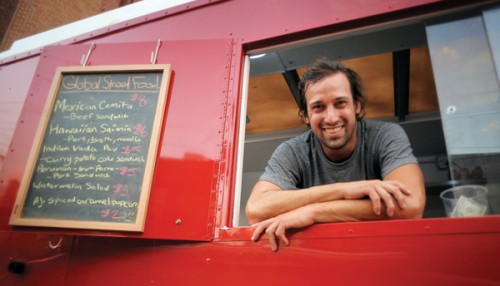CHICAGO, IL – On an unusually warm fall afternoon, Mike Maloney leans over the counter, offers an easy smile and asks curious customers standing outside of his shiny, red food truck if they have any questions about his menu.
One man studies the global street fare options, written on a chalkboard that’s hung on the side of the truck. He steps up and asks Maloney for the Peruvian butifarra, an aji roast pork sandwich with red onion salsa criolla and aji Amarillo pepper mayo.
Maloney, co-owner of Homage Street Food, moves methodically through his mini-commercial kitchen. He pulls the sandwich out of the warmer and grabs a paper bag and napkins from the plastic storage container that sits on an otherwise empty stainless-steel table. He delivers the order through the window, rings up the total on a cash register and marks the sale on a yellow legal pad.
Maloney, who today wears a blue T-shirt, jeans and black Chuck Taylors, brought the butifarra back to the menu to appease warm-weather fans.
“There is a huge Asian influence in Peruvian cooking, so this is like a Latin version of a banh mi sandwich,” he said. “So it’s a nice summer sandwich.”
Maloney and his wife, Elaine Toner, who worked in restaurants for several years, originally planned to open their own 20-seat restaurant. They spent time in Western Europe and Peru and wanted to introduce the unique dishes they discovered along the way.
By early 2010, Maloney said they realized that running a food truck was a more affordable option. For nearly $15,000, they bought and retrofitted a Wisconsin utility truck and purchased the supplies they’d need for the first few months of business.
When Maloney and Toner launched Homage Street Food in August, they joined a band of food trucks that regularly patrol city streets. The owners of these trucks said the ability to start up businesses with little capital gives them a chance to make a name for themselves in Chicago’s restaurant scene. They can also navigate a new, creative business model, where they communicate with customers on Twitter or Facebook.
As the food truck movement began to build, opposition surfaced from owners of restaurants and other businesses. They said food trucks fail to meet health and safety standards and bring unfair competition to restaurants since they reap customers without paying rent or property taxes.
Maloney understands these concerns, but said a compromise could keep both restaurants and food trucks happy.
“I’ve worked in restaurants,” Maloney said. “My goal is to have a restaurant. A good portion of the truck owners want to have a restaurant.
“It comes down to the choice of the consumer. If a consumer wants to go to a sit-down restaurant, that’s their choice. If they want to stop at a truck and pick up a sandwich, they should be given that choice too.”
Elizabeth Milnikel, director of the Institute for Justice Clinic on Entrepreneurship at the University of Chicago Law School, stands on the side of the food trucks.
Several years ago, Milnikel and her law students represented a homeless man who sold flowers on the street — an illegal venture in the city. They tried to help him get licensed as a peddler, but saw little success since he had several upaid tickets, she said.
They soon began working with the Asociación de Vendedores Ambulantes, a Little Village organization that lobbies for street vendors who sell fare like tamales and elotes. They also heard that police often shut down, ticketed or arrested their vendors.
As Milnikel and her students researched further, they realized that street vendors face restrictions all over the country, she said. For example, several cities establish no-vending zones or prevent vendors from stopping unless flagged by a customer.
“Some cities are more restrictive than others,” she said. “Chicago seems to throw every restriction ever invented at these people who are trying to make an honest living.”
According to current Chicago ordinances, “mobile food dispensers,” or people who serve food from wheeled vehicles on a public way, must abstain from preparing food on the go. Instead, they must make food in a kitchen and wrap it before putting it in their trucks.
“That’s limiting to how fresh they can make their food and serve their customers on demand,” Milnikel said. “That’s a major issue, and that’s unusual to Chicago.”
Current ordinances also prohibit mobile food dispensers from serving food before 10 a.m. and from parking within 200 feet of any restaurant.
Milnikel said she heard several stories in recent months about police stopping traffic to measure the distance between food trucks and restaurants or convenience stores.
“The more we hear about how this law is being enforced and how it’s limiting people’s opportunities to start driving businesses with small amounts of capital, the harder we’re going to try to push the city to open the laws up for more people to have these kinds of opportunities,” she said.
Aaron Berlin, a soon-to-be sworn in lawyer at Kirkland & Ellis, worked with the IJ clinic while in law school at the University of Chicago.
From his perspective, people involved in the push to allow more mobile vendors agree that they should be able to prepare food on trucks. He said it not only allows for interesting experimentation, but also helps someone with talent but little money start a business.
Find the entire article by Amanda Robert <here>




